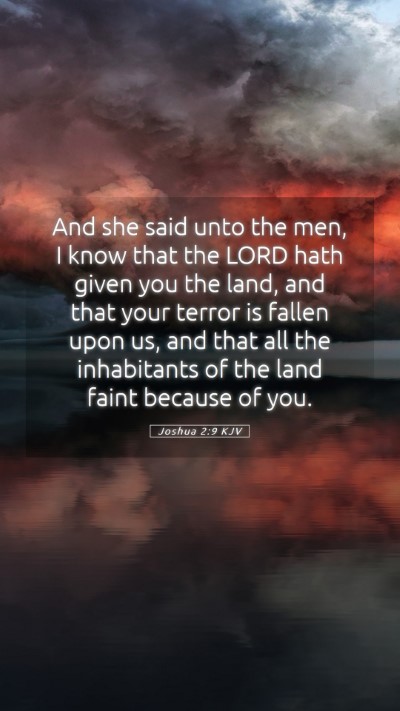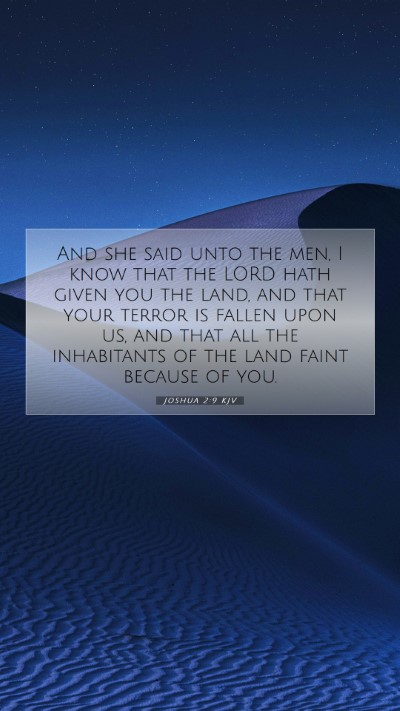Old Testament
Genesis Exodus Leviticus Numbers Deuteronomy Joshua Judges Ruth 1 Samuel 2 Samuel 1 Kings 2 Kings 1 Chronicles 2 Chronicles Ezra Nehemiah Esther Job Psalms Proverbs Ecclesiastes Song of Solomon Isaiah Jeremiah Lamentations Ezekiel Daniel Hosea Joel Amos Obadiah Jonah Micah Nahum Habakkuk Zephaniah Haggai Zechariah MalachiJoshua 2:9 Meaning
What is the meaning of Joshua 2:9?
And she said unto the men, I know that the LORD hath given you the land, and that your terror is fallen upon us, and that all the inhabitants of the land faint because of you.
Joshua 2:9 Bible Verse Meaning
Bible Verse Commentary on Joshua 2:9
Understanding Joshua 2:9
In Joshua 2:9, the text reveals profound insights into faith, fear, and the recognition of God's power. This verse is part of a larger narrative about the Israelite spies sent to Jericho, where they encounter Rahab, a harlot who acknowledges the power of the Israelite God. Her declaration in this verse is pivotal for understanding the dynamics between faith and works, the nature of God's providence, and the implications of grace.
Biblical Context
The book of Joshua outlines the Israelites' journey into the Promised Land under Joshua's leadership after Moses' death. The sending of spies into Jericho (Joshua 2) serves to gather intelligence about the land they are about to conquer. Rahab's interaction with the spies not only demonstrates her knowledge of Israel's past but also highlights the universal reach of God's mercy and plan for redemption.
Meaning and Interpretation
Key Takeaways from Commentaries:
- Matthew Henry: Henry emphasizes Rahab's faith in the God of Israel despite her background. Her recognition of Israel’s God illustrates that faith can exist outside traditional boundaries and that God’s grace extends to all.
- Albert Barnes: Barnes points out that Rahab's words reveal a deep understanding of the fear that the people of Jericho had in regard to Israel. She articulates how the miraculous works of God struck terror into the hearts of their enemies, setting the stage for the Israelites' conquest.
- Adam Clarke: Clarke highlights the historical context in which Rahab’s faith is expressed. He notes that her plea represents not only personal salvation but also the entrance of a Canaanite into the family of God, which foreshadows the inclusive nature of the Gospel.
Spiritual Insights
Thematic Exploration:
- Faith and Fear: Rahab's fearless confession of faith amidst danger presents a powerful example of trusting God’s plan, even when circumstances seem dire.
- God's Sovereignty: The acknowledgment of God's mighty acts moves beyond mere recognition; it indicates a transformational understanding that leads to action — Rahab's protection of the spies.
- Grace and Redemption: Rahab's story illustrates that God's grace is available to all, emphasizing the inclusivity of His salvation plan throughout the Biblical narrative.
Application in Daily Life
The lessons derived from Joshua 2:9 are applicable for contemporary believers in a number of ways:
- How to interpret Bible verses can be approached by understanding the cultural and historical context of Scripture.
- Understanding difficult Bible passages becomes easier with contextual learning, helping believers apply these insights to daily challenges.
- The significance of personal testimony can encourage others; Rahab’s faith led to her eventual inclusion in the lineage of Christ, showcasing the importance of one's story.
Cross References
This verse is related to several other scriptures that expand its meaning:
- Hebrews 11:31: "By faith the harlot Rahab perished not with them that believed not, when she had received the spies with peace." This verse highlights Rahab's faith in the New Testament context.
- James 2:25: "Likewise also was not Rahab the harlot justified by works, when she had received the messengers, and had sent them out another way?" James emphasizes her deeds as evidence of her faith.
- Matthew 1:5: "And Salmon begat Boaz of Rahab; and Boaz begat Obed of Ruth; and Obed begat Jesse." This verse connects Rahab to the lineage of Jesus, further emphasizing the theme of redemption.
Conclusion
The exploration of Joshua 2:9 through various biblical commentaries unveils the layers of meaning within this crucial moment in the narrative of Israel’s conquest. It invites profound reflection on faith, grace, and God’s redemptive plan through seemingly unlikely individuals. Believers are encouraged to engage deeply with Scripture, seeking understanding, applying it to their lives, and sharing their faith stories as Rahab did.


